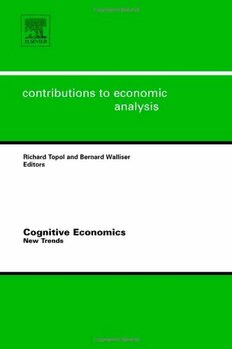
Cognitive Economics: New Trends PDF
279 Pages·2006·6.016 MB·English
Most books are stored in the elastic cloud where traffic is expensive. For this reason, we have a limit on daily download.
Preview Cognitive Economics: New Trends
Description:
In this book, cognitive economics is understood either in a broad sense as the influence exerted by some achievements of cognitive science on economics, or in a more restricted sense as the study of mental and adaptation processes implemented by economic agents in their interactions. In response to some critics addressed to the rationality and equilibrium principles in classical economics, cognitive economics associates an epistemic program grounded on individual beliefs and reasoning and an evolutionist program concerned with learning processes in a social context. The book, which is the result of the first Conference about Cognitive Economics held in Europe, gives an overview of various recent achievements of cognitive economics and is intended to better define its motivations and its boundaries. The proposed articles deal with the individual deliberation process of a single decision-maker, the conjoint learning process of several players in a game, the coordination of heterogenous economic agents through beliefs as well as with applications to entrepreneurial behavior, consumer interactions or knowledge economics. These articles also illustrate the different tools and methods which are currently used in the domain and enlarge those traditionally used in economics, from analytical work to model simulations, from conceptual work to laboratory experiments. "Contributions to Economic Analysis" was established in 1952. The series purpose is to stimulate the international exchange of scientific information. The series includes books from all areas of macroeconomics and microeconomics.
See more
The list of books you might like
Most books are stored in the elastic cloud where traffic is expensive. For this reason, we have a limit on daily download.
